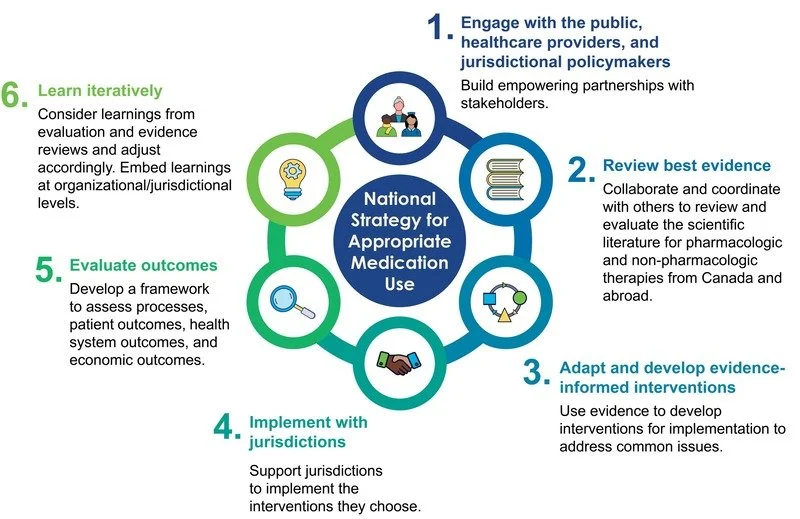While issues of drug access and affordability are often discussed, since 2016 the Canadian Medication Appropriateness and Deprescribing Network (CADeN) has been calling on policymakers to make appropriate use of medications a priority of equal importance. More specifically, CADeN has been calling for the creation of a national strategy to promote the appropriate use of medications for all.
Since 2022, CADeN has been a key stakeholder of Canada’s Drug Agency and its transition office, supporting efforts to develop a strategy aimed at improving the appropriate prescribing and use of medications nationally, for better patient health and improved system sustainability.
Some important policy milestones for the network :
A National Strategy: Medication Appropriateness for all Canadians
2016
Completion of a national scan of policies implemented by Canadian jurisdictions to support appropriate prescribing
2019
Publication of an international review comparing policies aimed at deprescribing sedative-hypnotic medications.
2019 - 2021
Development and publication of a national strategy for appropriate medication use for Canada
2022 - 2024
Key stakeholder of the Canadian Drug Agency Transition Office and its Appropriate Use Advisory Committee, contributing to develop a vision and mandate for a future Canada Drug Agency.
2024 - present
Active stakeholder of Canada’s Drug Agency, supporting efforts to develop a national strategy aimed at improving the appropriate prescribing and use of medications, for better patient health and improved system sustainability.
WHY CANADA NEEDS A STRATEGY
Around the globe, concern is mounting about the rate of harm caused by inappropriate medication use, and Canada is no exception. Those populations most vulnerable to medication harms include women, older adults, and people with low incomes. We should also be concerned about the impact of inappropriate medication use in other vulnerable populations, such as Indigenous peoples, and people of other racial and ethnic minorities.
National experts from medical, academic, community and political spheres are worried. They know that too many Canadian seniors take too many medications. What's more, they know an alarming proportion of older Canadians take potentially inappropriate medications—a medication becomes inappropriate when its potential to cause harm outweighs its potential for benefit. Seniors suffer numerous consequences for taking these medications: falls, fractures, hospitalizations and premature loss of independence are only a few examples. The costs are astronomical: collectively we spend an estimated 1.4 billion dollars each year on treating adverse effects caused by potentially harmful medications in older Canadians (Morgan et al. 2016).
OUR PROPOSED STRATEGY
First and foremost, Canada’s medication appropriateness strategy must be informed by real-world research reflecting patients’ lived experiences. At its centre, our strategy proposes a national coordinating organization to implement provincial, evidence-based interventions. This allows both for interventions to be tailored to the needs of each individual province, and also facilitates the rigorous evaluation of outcomes at the patient, system and economic level. An agile strategy would continuously collect, review and learn from real world data.
Read more about the evidence to support different medication appropriateness interventions.
Check out this infographic developed in partnership with Canada’s Drug Agency to learn more about the current state of appropriate use of medications in Canada.
Our large-scale medication appropriateness initiatives
Learn more about the following large-scale programs developed in collaboration with provincial governments:
We need your help!
We are looking for new partners from all Canadian provinces and territories who want to collaborate on the implementation of large- and small-scale medication appropriateness initiatives. Let’s work together to create intersectional change and eliminate harm from inappropriate medication use.




